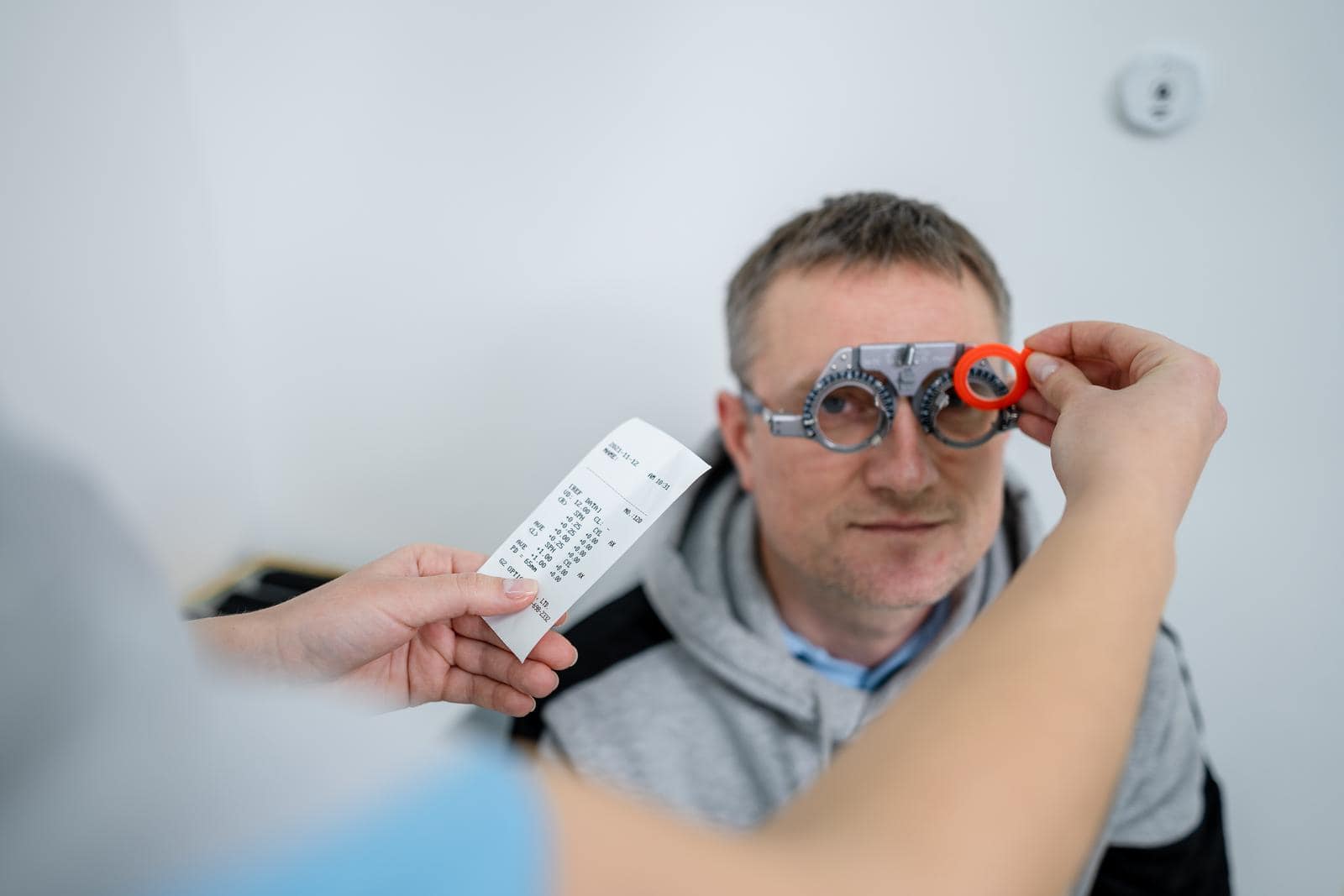Updated on April 29, 2025
Eye Exam Costs and What Affects it


Vision Center is funded by our readers. We may earn commissions if you purchase something via one of our links.
How Much Does an Eye Exam Cost?
Eye exams vary in cost depending on where you get yours done. Large retail vision providers often charge $100 or less.

Getting an eye exam from an independent eye doctor may cause more. A vision care plan from your vision insurance may also cover some or all eye exam costs.
| Retailer | Price |
| LensCrafters | $79 |
| Visionworks | $75 |
| Costco | $70-$100 |
| Target | $70-$100 |
| Walmart | $75+ |
| America's Best | $50 |
LensCrafters Eye Exam Price
LensCrafters provide eyeglasses as well as eye exams. The costs can go as high as $79.95, but the price could be lower with frequent discounts.
They also accept most major insurance providers, allowing you to use your insurance to pay for exams. However, they'll need to verify your eye and vision insurance eligibility beforehand.
Visionworks Eye Exam Price
The cost of an eye exam without insurance at Visionworks starts at $75. However, this may vary based on the location you choose.
Contact the local Visionworks store to find out their scheduling and pricing. They also accept most major insurance providers that can also help lower the fee.
Costco Eye Exam Price
An eye exam without insurance at Costo may vary depending on the location. No matter what, it is considered low-cost compared to private eye doctors. You can usually get an eye exam for around $70.
Costco also accepts most vision insurance coverage plans, which can help cut costs even further. However, this can vary because Costco optometry offices are all independent. Some Costco offices don’t take insurance at all.
Target Optical Eye Exam Price
The cost of an eye exam without insurance at Target starts at around $70. Target accepts many vision insurance plans that would make the price even cheaper. You can also use discount plans to reduce the price.
Most eye exams in Target Optical are conducted by self-employed doctors who lease space in the store. You can book an exam online by entering your ZIP code.
Walmart Eye Exam Price
The cost of an eye exam without insurance at Walmart starts at $75. Walmart accepts most major insurance providers for eye exams and in-store purchases. Vision insurance can bring down the cost of your eye exam.
America’s Best Eye Exam Price
At America’s Best, eye exams are free when you buy two pairs of glasses. If you don’t buy two pairs of glasses, the eye exam is only $50. America’s Best also accepts most major insurance providers.
Does Insurance Cover Eye Exams?
Traditional health insurance usually does not cover eye exams unless considered “medical” exams. Your health insurance might cover you if you have a medical eye problem.
For example, a routine vision exam may diagnose you with “nearsightedness.” A medical eye exam could give you a diagnosis like "conjunctivitis."
You can purchase additional vision insurance if your health insurance does not cover regular eye exams. Depending on the company and plan, your vision insurance may cover some or all of your eye exam costs. The cost of your co-pay will also vary.
Can You Get an Eye Exam Without Insurance?
Yes, you can get a vision test without insurance. Eye exam prices will vary, and you will have to pay out of pocket for it. You'll also have to pay for any glasses or contacts.
If you do not have vision insurance, you may visit a larger retailer like Costco or Walmart. They run optometric clinics with qualified eye doctors at lower costs. These retailers exist all across the United States.
Likewise, the National Eye Institute lists organizations providing free eye exams, vision screenings, and glasses.
Factors That Affect Eye Exam Costs
Like other medical services, eye care will vary depending on different factors. These factors include:
Location
Where you live affects how much you pay for an eye exam. Prices will be higher in urban areas than in rural ones. Living in urban areas is more expensive, affecting eye exam prices.
Insurance Coverage
Your health insurance coverage determines whether you receive reimbursement for your eye exam. Some companies offer discounts for patients who have their own vision insurance.
Patient Status
Whether you're a new or old patient can also influence the price of your eye examination. New patients typically pay more than those who have seen the doctor before. Your doctor may need to conduct additional tests to determine your health.
Type of Eye Care Provider
Eye exams at independent eye doctors are usually more expensive than at retail stores or optical chains. You're usually paying more for the doctor's expertise and tools. Retail stores and optical chains usually only offer basic eye tests.
Specialized Care
Sometimes, your eye doctor may need to perform additional procedures or tests. This type of specialized care adds to the overall cost of your eye exam. They may also refer you to a specialist, increasing the cost.
What Do Comprehensive Eye Exams Check?
Eye exams are important because they can detect problems early. Different places offer eye exams at various prices, depending on various factors. Carefully assessing your options can save you money while getting the best care possible.
This includes:
- Diabetes
- High blood pressure
- High cholesterol
- Lupus
- Glaucoma
- Macular degeneration
Checking your eyes for diseases early makes comprehensive eye exams a cost-effective method of maintaining eye health. They allow you to manage potential issues and reduce the need for more expensive treatments in the future.
How Long Do Eye Exams Take?
A comprehensive eye exam can take anywhere between 30 minutes and an hour. It involves a series of tests that each examine different aspects of your vision and eye health:
- Visual acuity: Measures your vision’s sharpness
- Visual field: Checks for blind spots in your peripheral vision
- Pupillary reactions: Observes your pupils to see how they react to light and close objects
- Cover test: Checks how your eyes work together
- Extraocular muscle function: Checks if you have normal eye movements
- Retinoscopy: Checks which lenses are appropriate if you need eyeglasses or contact lenses
Eye doctors recommend you get a complete eye exam every year or two. You may visit the eye doctor more often if you have poor vision or an eye disease.
Summary
Eye exams are important because they can detect problems early. Different places offer eye exams at various prices, depending on various factors. Carefully assessing your options can save you money while getting the best care possible.
Traditional health insurance doesn't cover eye exams. However, if the exam is deemed medically necessary, your insurance can cover it.
In this article
15 sources cited
Updated on April 29, 2025
Updated on April 29, 2025
About Our Contributors
Mara Sugue, with a B.A. in Social Sciences, is a dedicated web content writer for Vision Center. She is committed to making eye health research accessible and understandable to people from diverse backgrounds and educational levels. Her writing aims to bridge the gap between complex vision health topics and readers' needs for clear, factual information.
Dr. Melody Huang is an optometrist and freelance health writer with a passion for educating people about eye health. With her unique blend of clinical expertise and writing skills, Dr. Huang seeks to guide individuals towards healthier and happier lives. Her interests extend to Eastern medicine and integrative healthcare approaches. Outside of work, she enjoys exploring new skincare products, experimenting with food recipes, and spending time with her adopted cats.

